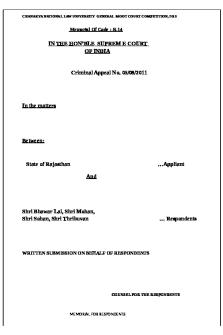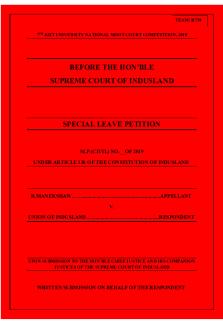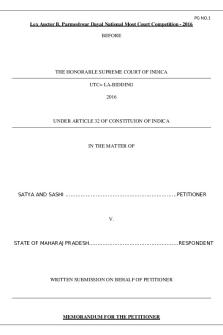Moot 1 - moot topic 1 PDF

| Title | Moot 1 - moot topic 1 |
|---|---|
| Author | Austin Adams |
| Course | Australian Constitutional Law |
| Institution | The University of Adelaide |
| Pages | 3 |
| File Size | 103.4 KB |
| File Type | |
| Total Downloads | 61 |
| Total Views | 186 |
Summary
moot topic 1...
Description
Moot 1 CHARACTERISATION & the s 51(xxvi) RACES POWER
SOUTH AUSTRALIA V
COMMONWEALTH [2020] High Court of Australia
FACTUAL BACKGROUND After winning the federal election in September 2019, the Federal Minister for Families announced that he would be conducting a review of social security payments. The review was directly instigated in the hope of stopping the intergenerational cycle of poverty and dependence on welfare in Australia’s most disadvantaged communities. According to the Minister’s statement at a press release announcing the proposed reforms, the new provisions would encourage parents into the workforce and off welfare. It would also discourage welfare recipients from having large families which can consequently increase the chances of children being raised in poverty. This public debate had been influenced by a story presented on the Four Corners program, highlighting the extent to which children in remote indigenous communities were still bearing the consequences of alcoholism, welfare dependency and poverty, in spite of the Northern Territory intervention and subsequent reforms. Several Ministers also highlighted considerable research around the cycles of poverty and welfare dependency across generations. According to the Explanatory Memorandum accompanying the Amendment Bill, the new provisions were directly targeted at preventing and discouraging welfare dependency across generations of families, particularly in indigenous communities -‘too many children continue to be raised in poverty, in circumstances where parents are entirely dependent upon welfare, and children are too frequently exposed to the effects of substance abuse and violence within their families and communities’. Human rights activists strongly campaigned against the proposed reforms on the basis that they effectively introduced a one child policy for disadvantaged Australians, with particularly severe consequences for indigenous families. Despite the strong criticism against the reforms, the government ultimately introduced changes to the Social Security Act 1981 (Cth), which limited parenting payments to unemployed parents, effectively only providing government support for one child to certain families and prohibiting an increase in payment for children born after a parent starts receiving welfare. The changes thus removed the previous incremental increases which would take place after the birth of a second or subsequent child to a recipient of the government’s parenting payment. However, the provisions would not apply to somebody who had recently lost their job (but the exclusion would only last for a Laws 2008 Constitutional law SP5 2020
period of 6 months) or to parents who were prevented from working due to disability or illness. The provisions would only apply prospectively and in respect of children born after December 2019. The new provisions also excluded the operation of the Racial Discrimination Act 1975 (Cth). The new provisions provided as follows: Section 84FC (1) Parenting payments will be capped at the rate payable to a parent with the responsibility and care of one child, irrespective of the number of children for whom the parent is responsible for, where an applicant or recipient of a parenting payment meets the following criteria: (a) The person is an indigenous Australian, or identifies as being an indigenous Australian; and (b) The person resides in a region or area declared by the Minister to be a designated area under section 84FD. (2) A parent in receipt of a parenting payment is not entitled to an increase in that payment for any children born subsequent to commencing receipt of that payment. (3) This section does not apply to foster-parents or substitute parents who have assumed responsibility for the care and upbringing of children whose biological parents are unable to care for them. Section 84FD (1)
Where, in the opinion of the Minister for Families – (a) a specified geographical region or area has significantly high and persistent rates of welfare dependency, substance abuse, violence or crime, the Minister may issue a declaration that the specified region or area is to be treated as a designated area for the purposes of sub-section 84FC(1)(b).
The Minister for Families issued a declaration under section 84FD with respect to 17 regional communities, including the APY lands in South Australia. There was significant opposition to the new provisions within South Australia, including from within the Labor Government. The Premier announced that South Australia would commence proceedings in the High Court challenging the validity of the new provisions, but only under section 51 (xxvi). APPELLANT – South Australia RESPONDENT – Commonwealth
Laws 2008 Constitutional law SP5 2020
NB: In developing submissions for the moot, parties may not address any other head of power other than section 51(xxvi) and should consider the following constitutional issues:
Whether section 51(xxvi) is limited with respect to indigenous Australians, including to laws which benefit indigenous peoples;
Whether proportionality forms part of the test for characterisation of a law under section 51(xxvi).
Laws 2008 Constitutional law SP5 2020...
Similar Free PDFs

Moot 1 - moot topic 1
- 3 Pages

MOOT Memorial Respondents-1
- 36 Pages

Moot Speech
- 3 Pages

Moot script 2 - moot tuto
- 1 Pages

Moot court memorial for moot problem
- 32 Pages

Contract moot 21/25
- 8 Pages

92106489-Moot-Court-Memorial
- 20 Pages

\'R739\' - Moot memorial
- 34 Pages

moot court memorial 2
- 30 Pages

Compendium of moot competition
- 50 Pages

10 Role of Moot Court
- 4 Pages

Senior Moot Problem CG
- 3 Pages

Moot memo for Surrogacy
- 28 Pages

Moot notes - Example of mooting
- 3 Pages

TRCL MOOT Court Respondent -07
- 12 Pages
Popular Institutions
- Tinajero National High School - Annex
- Politeknik Caltex Riau
- Yokohama City University
- SGT University
- University of Al-Qadisiyah
- Divine Word College of Vigan
- Techniek College Rotterdam
- Universidade de Santiago
- Universiti Teknologi MARA Cawangan Johor Kampus Pasir Gudang
- Poltekkes Kemenkes Yogyakarta
- Baguio City National High School
- Colegio san marcos
- preparatoria uno
- Centro de Bachillerato Tecnológico Industrial y de Servicios No. 107
- Dalian Maritime University
- Quang Trung Secondary School
- Colegio Tecnológico en Informática
- Corporación Regional de Educación Superior
- Grupo CEDVA
- Dar Al Uloom University
- Centro de Estudios Preuniversitarios de la Universidad Nacional de Ingeniería
- 上智大学
- Aakash International School, Nuna Majara
- San Felipe Neri Catholic School
- Kang Chiao International School - New Taipei City
- Misamis Occidental National High School
- Institución Educativa Escuela Normal Juan Ladrilleros
- Kolehiyo ng Pantukan
- Batanes State College
- Instituto Continental
- Sekolah Menengah Kejuruan Kesehatan Kaltara (Tarakan)
- Colegio de La Inmaculada Concepcion - Cebu
